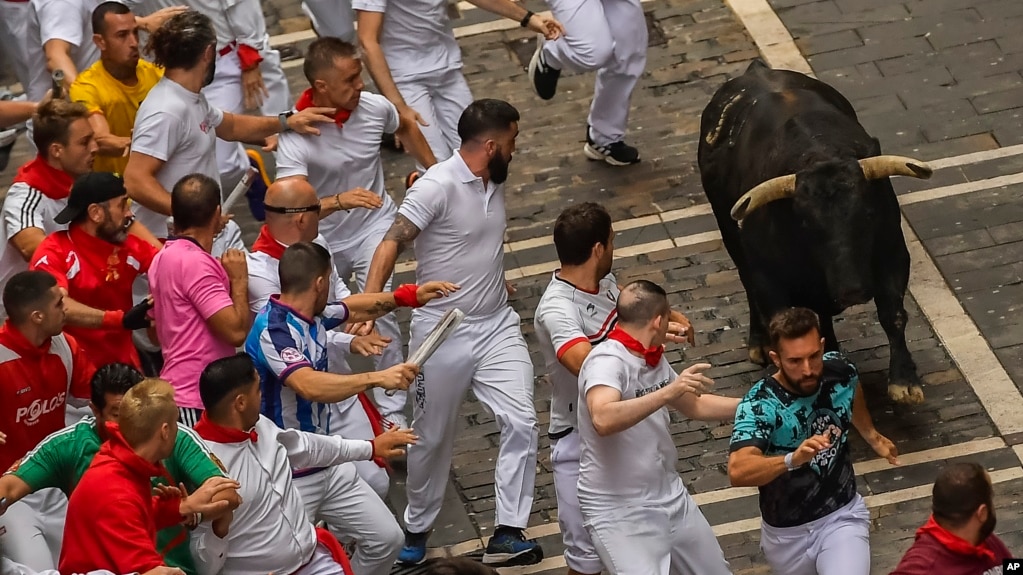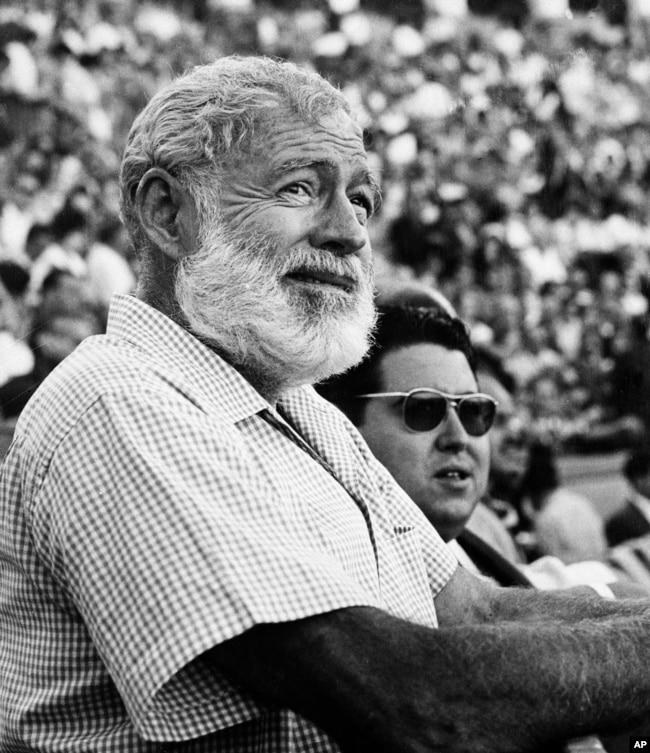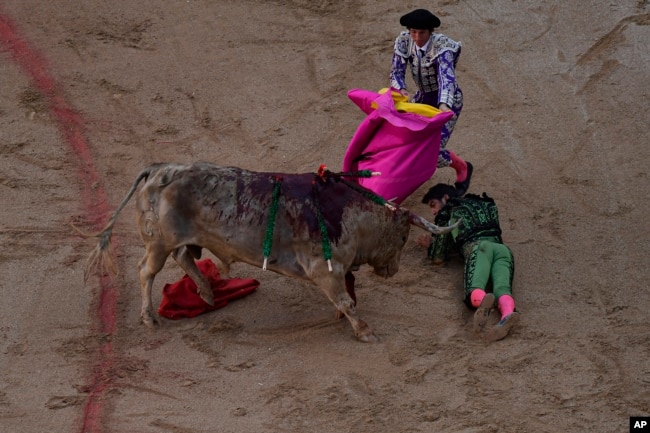Ernest Hemingway and Running of the Bulls

Ernest Hemingway, the Nobel Prize-winning American writer, first visited the Spanish city of Pamplona 100 years ago in July.
In July, people celebrate the feast of Saint Fermin in Pamplona where the traditional “running of the bulls” takes place. The event started more than seven hundred years ago. For nine days, people come to the northern Spanish city for bull running, bullfighting and partying.
The festival affected Hemingway so deeply that he returned eight times between 1924 and 1959.
Here is a description of what happens at the start of the bull running:
The bells would toll eight times. A rocket would be lit. And the bulls would charge out of the gate. At that moment, a crowd of runners wearing white clothes and red scarves would start to run. They would look back, move and dance to avoid being gored by the charging bull’s horns. Onlookers would cheer them on from balconies above.
In 1926, Hemingway wrote his first book, The Sun Also Rises. He wrote about his experiences in Pamplona and established himself as the voice of what became known as the "Lost Generation," a generation of people affected deeply by the events of World War I.
"I can't stand it to think my life is going so fast and I'm not really living it," says one character in the book.
"Nobody ever lives their life all the way up except bull-fighters," is the answer.

FILE - In this Nov. 1960 file photo, U.S. novelist Ernest Hemingway attends a bullfight in Madrid, Spain. (AP Photo/File)
Present-day Pamplona
Bill Hillmann is a 41-year-old English professor from Chicago. He first read The Sun Also Rises while he was in college at the age of 20. When he turned to the last page, he said he knew two things: He wanted to become a writer, and he would run in front of Pamplona's bulls someday.
Hillmann's first running of the bulls was in 2005. He has been running ever since. "I got here, and I was just blown away by it. It was everything in the book but times ten…It was bigger. It was wilder. It was crazier," he told Reuters.
He has been gored twice, in 2014 and 2017, but that has not lessened his interest. "I've basically been kind of following Hemingway's ghost around…I'm a little bit haunted by him," Hillmann added.
Sixty-nine-year-old Cheryl Mountcastle first read The Sun Also Rises at her New Orleans high school in Louisiana. For the past 24 years, she has rented the same apartment in Pamplona for the festival with her family. She said the book does not give details about another side of the festival - such as sharing food and dancing in the street.
Leontxi Arrieta is one of the few remaining Pamplona natives who met Hemingway. The 91-year-old tells Reuters that Hemingway and his fourth wife, Mary Welsh, stayed at her house. It was on their last visit to the festival in 1959, two years before Hemmingway’s death.
Arrieta remembered that Hemingway wrote, drank vodka, and shocked the family by removing the crucifixes from the wall and putting them away.

Bullfighter Miguel Angel Perera is pushed by a bull during the San Fermin fiestas in Pamplona, July 10, 2023. (AP Photo/Alvaro Barrientos)
What has changed?
Last year, 1.7 million people came to the festival, also known as Sanfermines. They left 1,200 tons of broken glass and other waste behind. A place on a balcony with a good view of the bull-running event can cost $220 per person.
Pamplona native Miguel Izu has written about the festival's links to Hemingway. He believes the writer's influence on its popularity has not been as large as people say.
"Before Hemingway, tourists were already coming, especially from France," Izu explained.
However, Izu acknowledges that Pamplona is still using Hemingway to gain attention. "We made him into a sort of Sanfermines icon,” he said.
But not every foreigner at the festival has been coming because of Hemingway. Australian William Kappal and his friends learned about Sanfermines by watching YouTube.
Asked if they had ever heard of Hemingway, Kappal said "Nah. Should we look him up?"
Words in This Story
gate –n. a large door
scarf –n. (pl. scarves) a piece of cloth worn around the neck
gore –v. to wounded by the horns of an animal
balcony –n. a raised structure on the side of a building from which people can look at the street below
blow away –v. (phrasal, informal) to be really affected by something; impressed
crazy –adj. wild, uncontrolled, not mentally healthy
ghost –n. the spirit of a person who has died
haunted –adj. to feel the presence of someone’s spirit or of some feeling again and again
rent –v. to pay for the use of a living place, device or vehicle for a period of time
crucifix –n. a model of a cross with Jesus Christ crucified on it; a special religious image of the crucifixion of Jesus Christ
tourist –n. a person who travels for pleasure
icon –n. a person who is famous for his or her relationship with a place, thing or event
https://learningenglish.voanews.com/a/ernest-hemingway-and-running-of-the-bulls-/7177954.html


